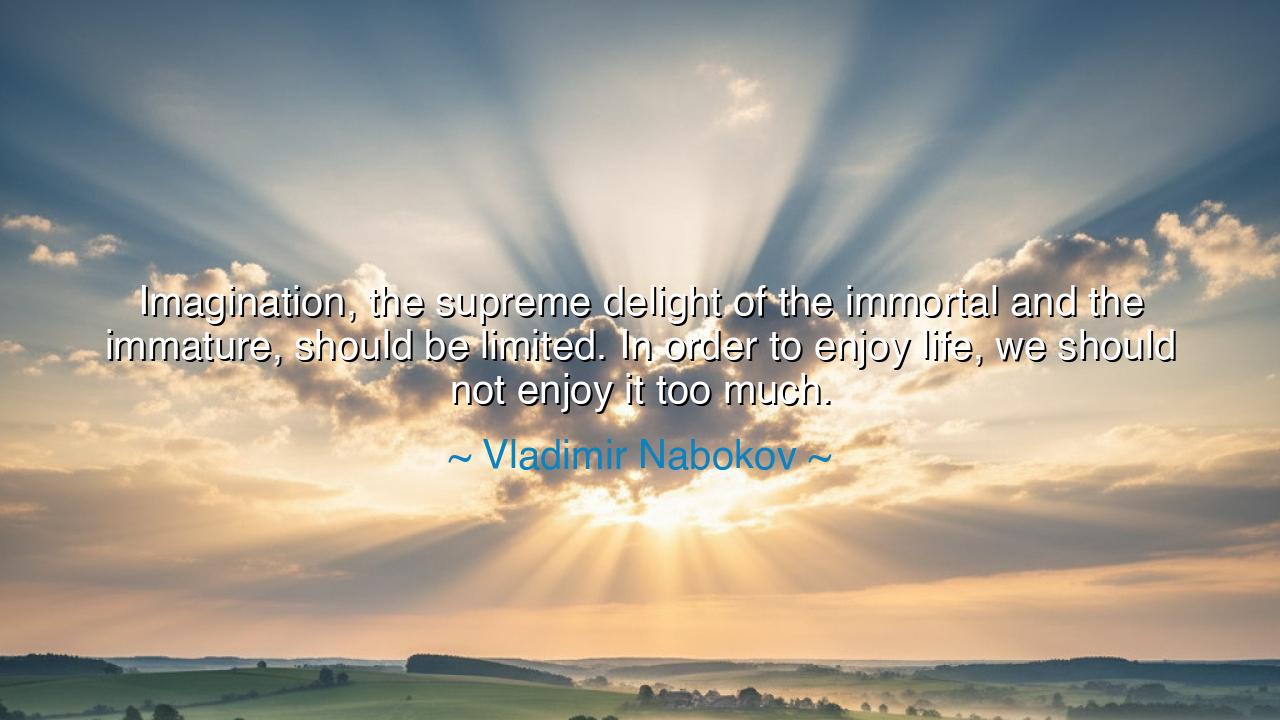
Imagination, the supreme delight of the immortal and the
Imagination, the supreme delight of the immortal and the immature, should be limited. In order to enjoy life, we should not enjoy it too much.






“Imagination, the supreme delight of the immortal and the immature, should be limited. In order to enjoy life, we should not enjoy it too much,” wrote Vladimir Nabokov, a man whose mind shimmered between the realms of beauty and irony, of wonder and restraint. In these words lies a paradox — that the very force that makes life radiant, imagination, must be kept within bounds lest it consume the one who wields it. For Nabokov knew the secret that many forget: the human soul, though divine in spark, is fragile in frame. To soar endlessly in imagination is to risk never landing again upon the earth, and to love life too fiercely is to crush it in one’s embrace.
The origin of this thought lies in Nabokov’s lifelong tension between the dream and the discipline. As a novelist and lepidopterist, he delighted in creation — in the flutter of a butterfly’s wing and the shimmer of invented worlds. Yet, unlike many romantics before him, he saw imagination not as a wild god to be worshiped, but as a divine servant to be tamed. His warning is subtle, almost mischievous: that both the immortal — the one who transcends — and the immature — the one who has yet to learn restraint — find endless pleasure in imagining. But the mortal, wise and weary, learns that joy too vast can be perilous, and that the sweetness of life must be sipped, not devoured.
To the ancients, this wisdom would have been familiar. The Greeks spoke of Sophrosyne — the virtue of temperance, the harmony between passion and measure. When Icarus, intoxicated by the thrill of flight, soared too near the sun, his wings of wax melted, and he fell into the sea. His tragedy was not that he lacked imagination, but that he lacked restraint. He wished to taste the heavens, but in doing so, he forgot the limits of his nature. Nabokov’s warning echoes through that myth: we must reverence imagination, but never surrender to it. For the same fire that gives life to art can also consume the artist.
Imagination, in its highest form, is divine play — it allows mortals to glimpse eternity. Yet when ungoverned, it becomes a fever, turning joy into obsession. The immature revel in boundless fancy, unable to bear the weight of the real world; the immortal, having transcended flesh, delights in pure thought, unchained from consequence. But man stands between these two states — he must live in the world, not above it. Nabokov’s counsel is therefore not to dull the imagination, but to discipline it, so that we may live with clarity and pleasure, rather than drowning in the endless flood of our own dreams.
Consider Oscar Wilde, whose imagination was as brilliant as any man’s, and whose life burned with unrestrained delight. He adorned his world with beauty, wit, and excess — he sought to live art itself. Yet the same fire that made him immortal in word led him to ruin in life. His tragedy was not that he enjoyed too little, but that he enjoyed too much. He became the living emblem of Nabokov’s warning: that in loving beauty without measure, one risks losing both beauty and self.
Thus, the teaching stands clear: joy is a fruit that spoils if overripe. The art of life lies in moderation, not in denial — to let the imagination wander, but to call it home; to drink of pleasure, but not to drown in it. For only those who know the boundaries of delight can savor it fully. The wise do not reject imagination, but shape it like a sculptor shapes marble — imposing limits not to imprison beauty, but to reveal it.
So remember, children of tomorrow: cherish your imagination, but govern it. Delight in life, but do not clutch at it too greedily. When beauty comes, gaze upon it with gratitude, and then let it pass. For life’s sweetness lies not in endless indulgence, but in the rhythm of longing and release, of desire and rest. To enjoy life, as Nabokov teaches, is not to seize it too tightly — but to live within its fragile wonder, aware that only through measure does joy endure.






AAdministratorAdministrator
Welcome, honored guests. Please leave a comment, we will respond soon